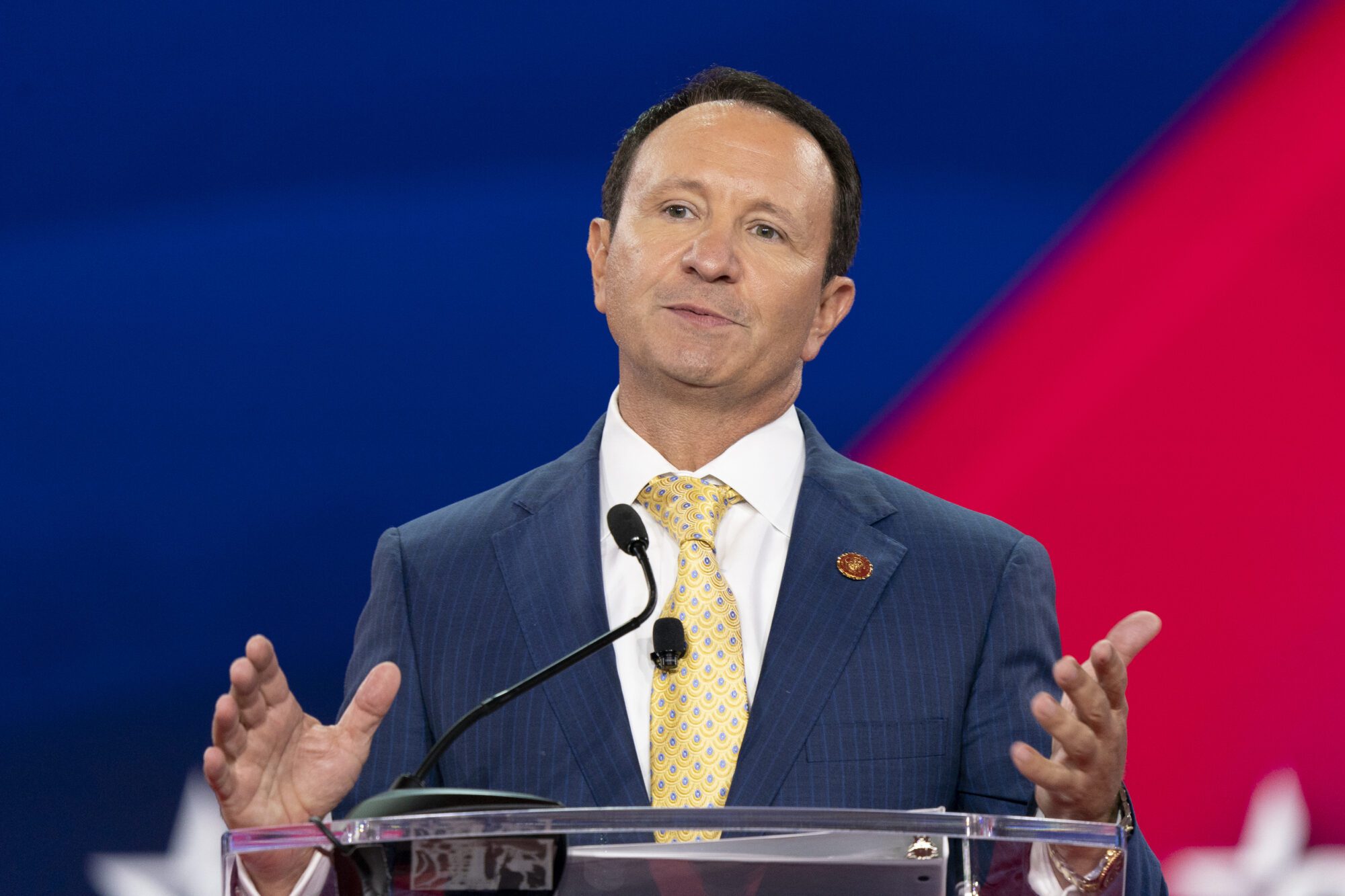The Five States Where Trifectas Are At Play in November
Parties are battling over governorships and legislatures in Kentucky, Louisiana, Mississippi, New Jersey, and Virginia, with the future of abortion and voting rights in the balance.
Daniel Nichanian | October 3, 2023


Voters in five states will elect their governor or legislators this fall, in each case deciding who controls their state governments for the next two years.
Most of these elections are playing out in the South, where Republicans could secure three more trifectas than they currently have—that is, control of the governorship and both chambers of their state legislature.
The biggest and most suspenseful battle is taking place in Virginia. Despite Democrats’ gains in the state since the 2000s, the GOP just needs to flip a couple of seats in the state Senate to grab full control of state government. Republicans are also aiming to gain control of Kentucky and Louisiana, in each case by flipping the governor’s mansion. All three states currently have divided governments.
In Mississippi, the GOP is defending its existing trifecta.
Democrats don’t have the opportunity to gain a new trifecta this fall, but they’re aiming to keep control of the state government in New Jersey, the most populous of these five states. And in a bonus addition to the fall’s calendar due to a single special election in New Hampshire, they have a shot to keep eroding the GOP majority in the nearly-tied state House, though they won’t be able to quite erase it for now.
These elections are a final messaging test for the parties before 2024, but they’ll also profoundly affect public policy around critical rights within these states, with measures ranging from LGBT rights in Louisiana and new abortion restrictions in Virginia hanging in the balance.
Below, Bolts guides you through each of the states electing governors or legislatures this year as part of our coverage of the 2023 local and state elections around the country. Much more is on the ballot in these states and many others, from a supreme court election in Pennsylvania—the only such race this year—to referendums in Maine or Ohio.
Kentucky
Current status: Split government, with a Democratic governor and Republican control of both legislative chambers
What’s on the ballot: The governorship
No matter what, the GOP will retain control of the Kentucky legislature heading into 2024 after very comfortably retaining majorities in the state House and Senate in 2022; those seats are not up for grabs until November 2024.
Republicans also have the votes to override vetoes by the governor, in a rare state where that only takes a simple majority, and they’ve rarely blinked. This year, the GOP-run legislature overrode Democratic Governor Andy Beshear’s veto of 15 bills, ramming through a ban on gender-affirming care for minors and major abortion restrictions.
Still, Beshear has flexed his executive power during his first term, issuing public health orders during the COVID-19 pandemic and winning a legal fight against GOP lawmakers who sought to block them. He also issued an executive order in 2019 that restored the voting rights of hundreds of thousands of Kentuckians who were permanently disenfranchised. And last year, he issued other executive orders to allow some people to access medical marijuana, drawing condemnation from Republican Attorney General Daniel Cameron, who is now challenging Beshear for the governor’s office; Beshear’s order eventually pressured state lawmakers into legalizing medical marijuana through legislation this spring.
The ensuing clashes have put November’s race between Beshear and Cameron on track to break fundraising records.


Louisiana
Current status: Split government, with a Democratic governor and Republican control of both legislative chambers
What’s on the ballot: The governorship, and both chambers of the legislature
All legislative seats in Louisiana are on the ballot this year, but we already know who will run the legislature come 2024 before a single vote has been counted.
Only Republican candidates filed to run in the majority of districts in both the House and the Senate, guaranteeing GOP majorities in each chamber. Still, the fall’s elections will determine whether they can easily pass their priorities in coming years.
John Bel Edwards, a Democrat has occupied the governor’s mansion over the last eight years, and he has vetoed many Republican bills in that time. Just this summer, he vetoed a barrage of legislation, including laws that criminalized getting too close to an on-duty police officer and banned discussion of sexual orientation in a classroom. Republicans have made major gains in the legislature during Edwards’ tenure, and earlier this year they finally clinched supermajorities in both chambers after a longtime Democratic lawmaker switched parties, giving them the power to override vetoes. But veto overrides have remained unusual in Louisiana; Republicans this summer held a special session to take up just a few of the bills Edwards vetoed, and while they passed a bill to ban gender-affirming care for transgender youth, they could not muster the votes for other legislation.
Edwards is now barred from running for re-election due to term limits. If the GOP flips the governor’s office, it would gain unified control of the state government and no longer have to worry about vetoes. The front-runner is Jeff Landry, the state’s ultra-conservative attorney general, who is worlds apart from the outgoing governor on criminal justice policy.
And even if Democrat Shawn Wilson pulls off an upset victory to become governor, the state’s legislative elections will determine the size of the Republican majority. Democrats have said they hope to break the GOP’s new supermajority, though the party has suffered from dysfunction, undercutting its preparation. Republican leaders, meanwhile, would like to grow their edge even more to make it easier to override vetoes.
Mississippi
Current status: Republican trifecta
What’s on the ballot: The governorship, and both chambers of the state legislature
The GOP is vying to keep unified control of Mississippi’s state government, which should be easy on the legislative side: Republican candidates are running unopposed in most Senate districts as well as in just shy of a majority of House districts, shielding them from any big surprise at the polls in November.
But Democrats have zeroed in on a scandal involving misspent welfare funds that has engulfed Republican Governor Tate Reeves, who is running for re-election and banking on the state’s red lean to prevail. He faces Brandon Presley, a member of the Mississippi Public Service Commission and a well-known politician in the state, who is aiming to hand Democrats’ their first victory in a governor’s race since 1999. Like past Democratic candidates in the state, Presley has vowed to expand Medicaid if he is elected, a reform Reeves has opposed; Mississippi remains one of only ten states that hasn’t expanded the program as provided by the Affordable Care Act, even though the expansion would cover more than 200,000 Mississippians.
The elections are unfolding in a tough landscape for voting rights and restrictions that depress participation, including a lifelong ban on voting for people convicted of many felonies—a policy that disenfranchises more than one in ten adults in the state, including sixteen percent of Black residents. And even though a new law meant to criminalize assistance with mail-in voting was blocked by a judge this summer, it has still left local organizations in a difficult position as they mount turnout efforts.
New Jersey
Current status: Democratic trifecta
What’s on the ballot: Both chambers of the state legislature
Democrats walked into the 2021 elections confident they would easily keep unified control over state government, but they only barely survived with Governor Phil Murphy’s securing re-election in a surprise squeaker.
Two years later, the stakes are considerably lower since the governorship is not on the line, but all legislative seats are up for grabs. And although the GOP, which gained seven seats in 2021, once made noise about 2023 being the year they flip a chamber for the first time in two decades, the party has already hit most of its obvious targets and it would have to reach into districts that are firmly blue. According to calculations by the New Jersey Globe, President Biden carried 25 of the state’s 40 legislative districts by double-digits in the 2020 presidential race. Even when Murphy survived statewide by three percentage point in 2021, he carried the majority of legislative districts by at least five percentage points. That gives Democrats a clear roadmap to retaining their legislative majorities this fall.
Unified Democratic control hasn’t meant that those in the party always see eye to eye, though. Relationships between the legislature’s Democratic leaders and the more progressive governor have been difficult at times since Murphy’s first election. Senate President Steve Sweeney’s shock election loss in South Jersey in 2021 removed one of the state’s more centrist politicians, but progressive priorities like same-day voter registration have still died in the chamber.


Virginia
Current status: Split government: a Republican governor and House, and a Democratic Senate
What’s on the ballot: Both chambers of the state legislature
Republican Governor Glenn Youngkin badly wants his party to seize control of the Virginia legislature, which would give him far more control over the affairs of the state. Alongside Youngkin’s victory in 2021, the GOP also flipped the state House. But the Senate was not on the ballot that year and remained Democratic, and since then it has frustrated conservative ambitions on many issues, including abortion rights, criminal justice, and voting rights.
Senate Democrats over the last two sessions have killed a barrage of Republican legislation, including bills that would have banned access to abortion at 15 weeks, ended same-day voter registration, enacted new voter ID requirements, and restrained the discretion of reform prosecutors to drop low-level cases.
If the GOP gains the Senate and keeps the House in November, it would open the floodgates for such bills. To get there, they need to flip two Senate seats (out of 40), and not lose more than one House seat compared to the state’s last elections. These margins are tight enough that Democrats are hopeful they’ll be the ones celebrating on Nov. 7 if they manage to not just retain the Senate but also flip the GOP-run House.
And there are many competitive seats; 14 House districts and 7 Senate districts were within 10 percentage points in the last governor’s race, according to a review of data supplied by the Virginia Public Access Project. (The University of Virginia’s Center for Politics reviews the specific districts that are the likeliest to decide the majority.) Both parties are pouring in large amounts of money to win them, with many ads focusing on abortion access.
These legislative races are the first general election since Youngkin dramatically tightened voter eligibility in March by ending his predecessor’s practice of automatically restoring the voting rights of people who leave prison. Many Virginians are unable to vote as a result.
Bonus: New Hampshire
Current status: Republican trifecta
What’s on the ballot: Just one state House seat
In the entire state of New Hampshire, only one state House district around Nashua is up for election in November. But with the state House nearly evenly divided between Republicans and Democrats, that election carries great symbolic weight.
Big gains in the 2022 midterms left Democrats within three seats of a majority in the state House and they made further gains in special elections this year, most recently on Sept. 19 by flipping a district in Rockingham County. That cut Republicans’ edge to just one seat, 198 to 197, putting Democrats on track to tying the chamber with an even number of representatives per party ahead of Nashua’s Nov. 7 special election, which is taking place in a district that leans strongly blue, according to Daily Kos Elections.
Then, on Monday, a House member announced that she would quit the Democratic Party, leaving her former party two seats behind heading into Nov. 7.
Practically speaking, the exact number of seats held by each party wouldn’t at this stage change the bottom line: The GOP’s hold on the chamber is already tenuous. This is the largest legislative body in the U.S. by far, and lawmakers have other jobs since they’re only paid $100 a year. This means that chronic absences make the chamber difficult to predict and manage on any given day. Expect more vacancies, and party switches, over the next 15 months.
Sign up and stay up-to-date
Support us
Bolts is a non-profit newsroom that relies on donations, and it takes resources to produce this work. If you appreciate our value, become a monthly donor or make a contribution.








